|
|
|
Sort Order |
|
|
|
Items / Page
|
|
|
|
|
|
|
| Srl | Item |
| 1 |
ID:
121130
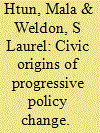

|
|
|
|
|
| Publication |
2012.
|
| Summary/Abstract |
Over the past four decades, violence against women (VAW) has come to be seen as a violation of human rights and an important concern for social policy. Yet government action remains uneven. Some countries have adopted comprehensive policies to combat VAW, whereas others have been slow to address the problem. Using an original dataset of social movements and VAW policies in 70 countries over four decades, we show that feminist mobilization in civil society-not intra-legislative political phenomena such as leftist parties or women in government or economic factors like national wealth-accounts for variation in policy development. In addition, we demonstrate that autonomous movements produce an enduring impact on VAW policy through the institutionalization of feminist ideas in international norms. This study brings national and global civil society into large-n explanations of social policy, arguing that analysis of civil society in general-and of social movements in particular-is critical to understanding progressive social policy change.
|
|
|
|
|
|
|
|
|
|
|
|
|
|
|
|
| 2 |
ID:
184993
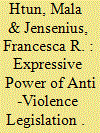

|
|
|
|
|
| Summary/Abstract |
We know more about why laws on violence against women (VAW) were adopted than about how much and in what ways these laws affect society. The authors argue that even weakly enforced laws can contribute to positive social change. They theorize the expressive power of VAW legislation, and present evidence for a cautiously optimistic assessment of current trends on violence against women and the ways that VAW laws affect social norms. Focusing on a time of major legal change related to VAW in Mexico, this article explores trends in behavior and attitudes related to violence by analyzing four waves of the National Survey on the Dynamics of Household Relations (ENDIREH), which include detailed interviews with thousands of Mexican women. The authors find that over this period, the share of women experiencing intimate-partner abuse declined, attitudes condoning violence shifted, reporting rates rose, and most women learned about legislation to protect their rights. These changes are consistent with the authors’ expectations about the expressive power of anti-violence legislation.
|
|
|
|
|
|
|
|
|
|
|
|
|
|
|
|
| 3 |
ID:
171116
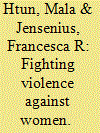

|
|
|
|
|
| Summary/Abstract |
In the 1990s and 2000s, pressure from feminist movements and allies succeeded in pushing scores of states to reform their laws to prevent and punish violence against women (VAW). Even in states with progressive legislation, however, activists face challenges to induce citizens to comply with the law, compel state authorities to enforce the law, and ensure the adequate allocation of resources for social support services. In this essay, we take stock of legislative developments related to VAW around the world, with a focus on the variation in approaches toward intimate partner violence and sexual harassment. We analyze efforts to align behavior with progressive legislation, and end with a discussion of the balance activists must strike between fighting VAW aggressively with the carceral and social support dimensions of state power, while exercising some restraint to avoid the potentially counterproductive effects of state action.
|
|
|
|
|
|
|
|
|
|
|
|
|
|
|
|
| 4 |
ID:
171288
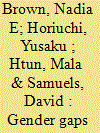

|
|
|
|
|
| Summary/Abstract |
The gender publication gap puts women at a disadvantage for tenure and promotion, which contributes to the discipline’s leaky pipeline. Several studies published in PS find no evidence of gender bias in the review process and instead suggest that submission pools are distorted by gender. To make a contribution to this important debate, we fielded an original survey to a sample of American Political Science Association members to measure participants’ perceptions of political science journals. Results reveal that the gender submission gap is accompanied by a gender perception gap at some but not all political science journals we study. Women report that they are more likely to submit to and get published in some journals, whereas men report as such with regard to other journals. Importantly, these gaps are observed even among scholars with the same methodological (i.e., quantitative or qualitative) approach.
|
|
|
|
|
|
|
|
|
|
|
|
|
|
|
|
| 5 |
ID:
168717
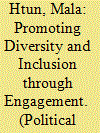

|
|
|
|
|
| Summary/Abstract |
Organizations—from academic and professional associations to private corporations and police forces—face challenges promoting diversity and inclusion among their workers and affiliates. Instead of training and regulations, recent research recommends mechanisms that engage managers and leaders in activities that involve behavioral changes. This article describes how we put the managerial engagement approach into practice by organizing a “Diversity and Inclusion Hackathon” at the 2018 annual meeting of the American Political Science Association. With 11 teams focused on a range of topics, the hackathon attracted more than 200 people and produced multiple outputs. It engaged scholars from a range of backgrounds, social identities, institutions, ranks, and beliefs in the generation of new norms, programmatic ideas, and plans for the profession. Although we cannot infer causality, analysis of the APSA Annual Meeting evaluation survey reveals that hackathon participants are significantly more likely to express positive perceptions of the conference.
|
|
|
|
|
|
|
|
|
|
|
|
|
|
|
|
| 6 |
ID:
096297
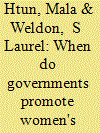

|
|
|
|
|
| Publication |
2010.
|
| Summary/Abstract |
This essay proposes a framework to analyze cross-national variation in women's legal rights. To explore the distinct logics of policy change, we disaggregate sex equality policies on two dimensions: 1) whether they improve the status of women as a group or alleviate gender-based class inequalities, and 2) whether or not they challenge the doctrine of organized religion and the codified tradition of major cultural groups. We show that policies promoting gender equality seek fundamental social change and therefore challenge historical patterns of state-society interaction concerning relations between the state and the market; the respective authority of the state, religion, and cultural groups; and the contours of citizenship. Different issues, however, challenge different aspects of these relations. What's more, the priorities, strategies, and effectiveness of advocates and opponents of change (including women's movements, left parties, international NGOs, and organized religion) are shaped by state capacity, policy legacies, international vulnerability, and the degree of democracy.
|
|
|
|
|
|
|
|
|
|
|
|
|
|
|
|
| 7 |
ID:
186658
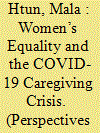

|
|
|
|
|
| Summary/Abstract |
The COVID-19 pandemic revealed, but did not create, the caregiving crisis in the United States: for most people, it was already a major ordeal to provide reproductive labor. The caregiving crisis was less visible before the pandemic because it was suffered unequally, in part due to the different positions of American women. Some women paid other women to do care work, women received differing sets of benefits from federal and state governments, and some women got far more support from their employers than did others. Pandemic-induced shocks, including the closure of K–12 schools and childcare centers, and reduced access to domestic workers and elder care workers, seemed to have triggered a closer alignment of perspectives and interests among diverse women. Although women’s demands for support seem to have pushed the Biden administration to propose more expansive family policies, stereotypes and norms that marginalize care work and care workers within families and across the economy also need to change to achieve equality for women.
|
|
|
|
|
|
|
|
|
|
|
|
|
|
|
|
|
|
|
|
|